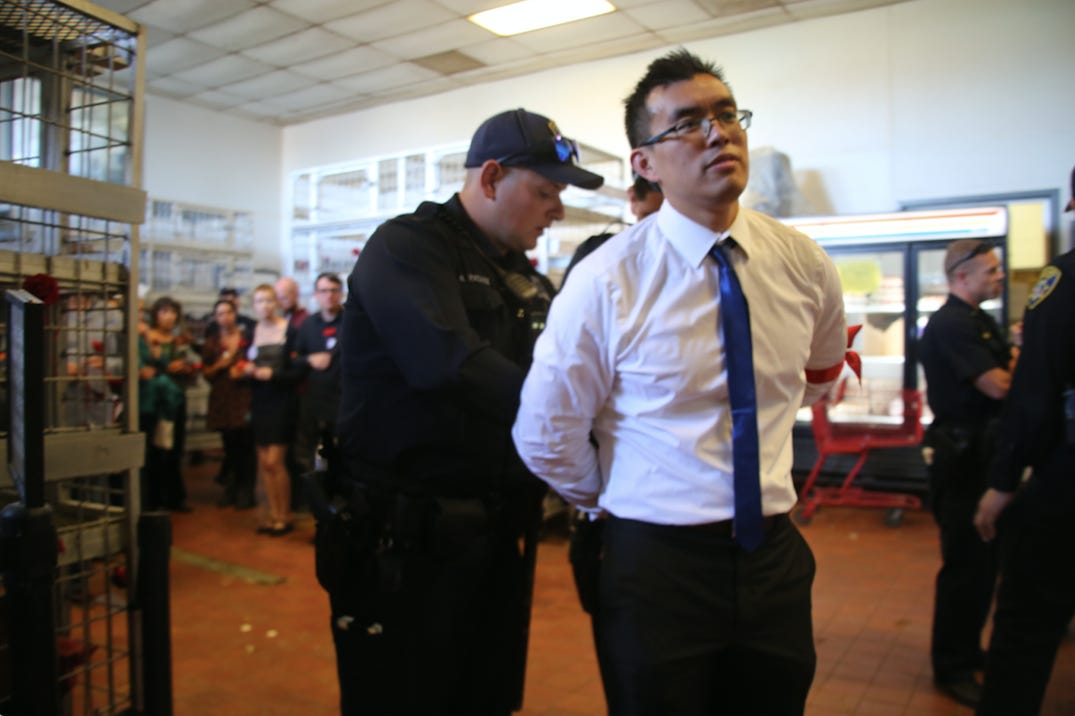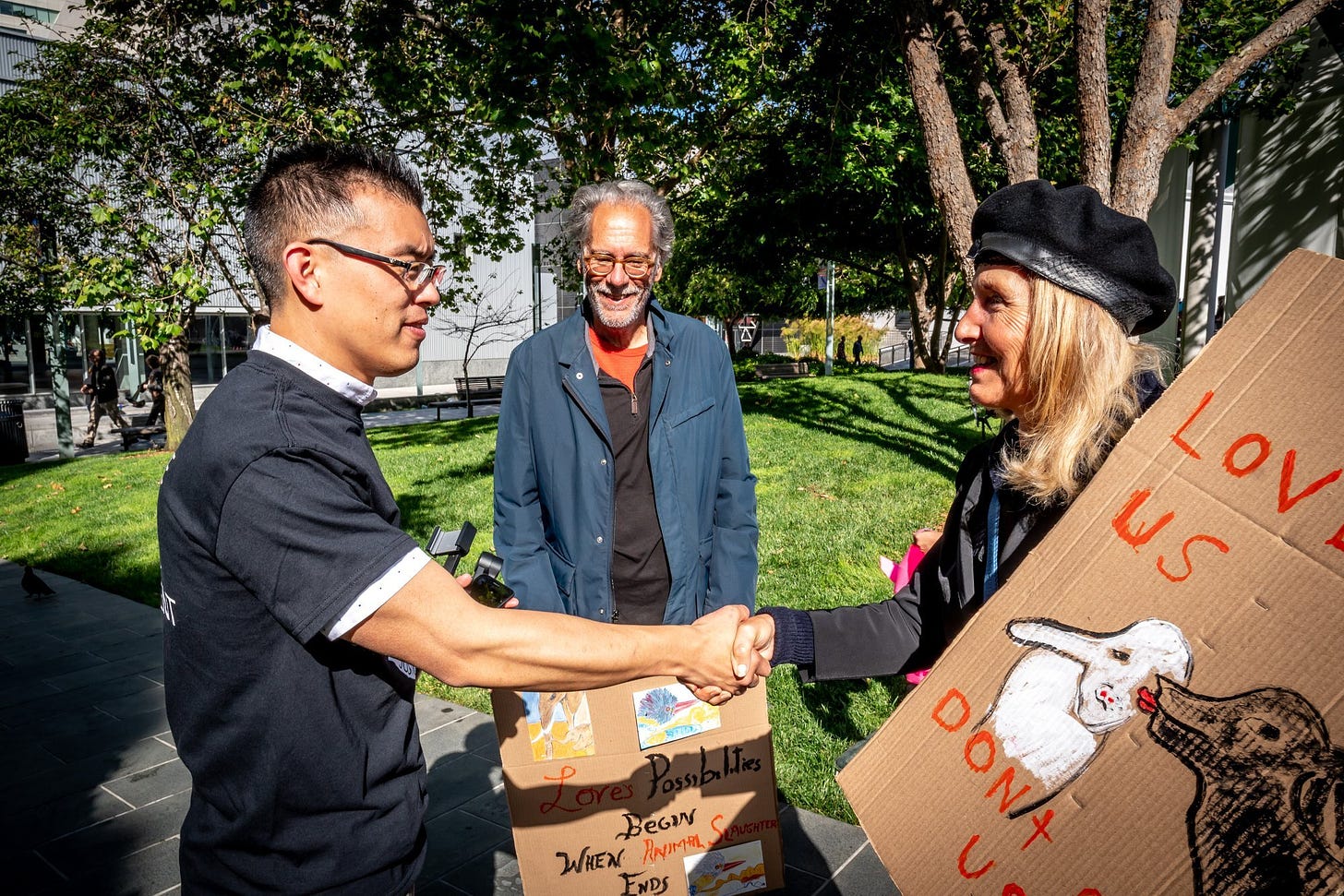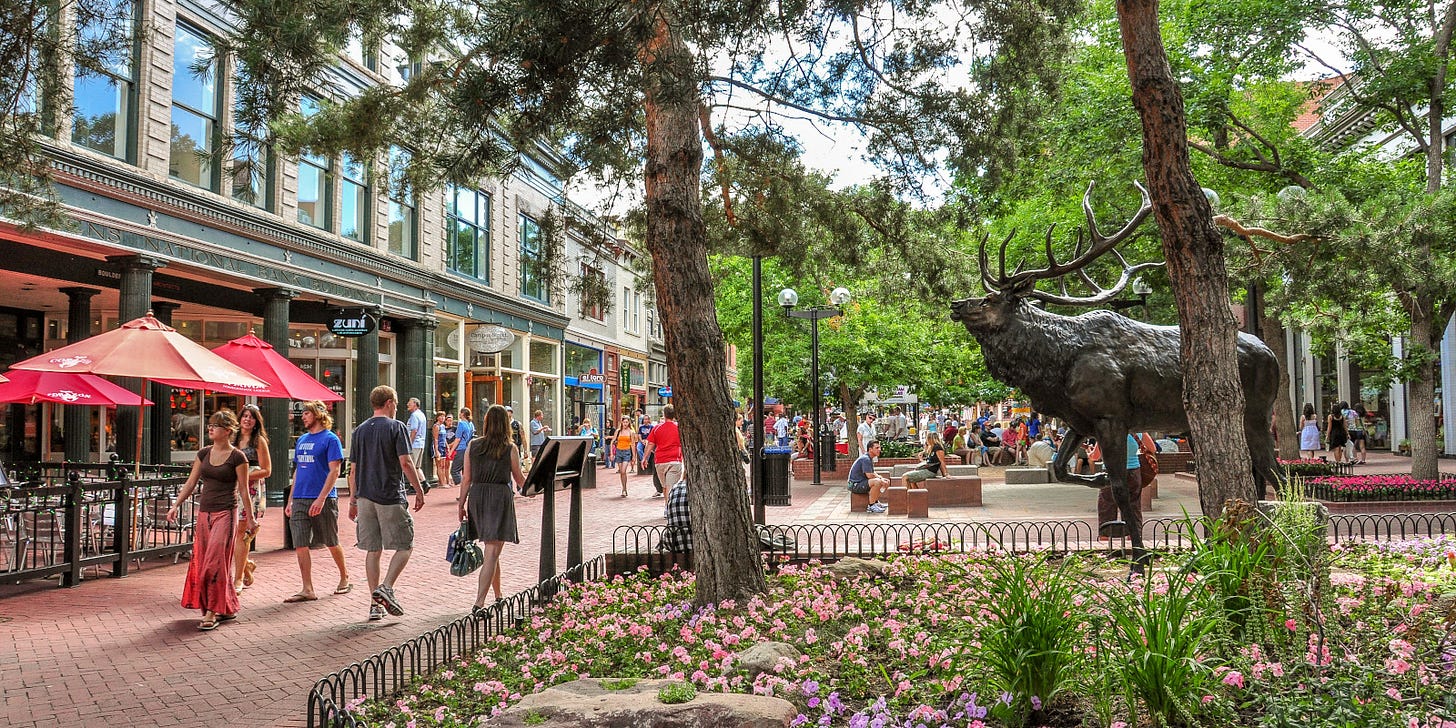10. Imagining the Green City
Public policy with animal rights activist and Berkeley mayoral candidate Wayne Hsiung
Welcome back to Giving to Strangers, a newsletter about making philanthropy better, written by me, Anya Marchenko. You can follow me on my newfangled Twitter.
And if you’ve made it here but aren’t subscribed, make sure to click here to receive the next Giving to Strangers in your inbox:

Take a second to imagine the Green City. The Green City is carbon-neutral and plant-based. Maybe it seems similar to places you’ve visited, but it doesn’t take long to see how the Green City is radically different. The houses have solar panels, generating carbon-zero electricity for families to power their homes. The roads downtown have been converted into green pedestrian-only zones. In cafes, families are eating chicken salad, bacon and eggs, delicious burgers. But the meat they’re eating is free of the unimaginable cruelty of meat elsewhere — it’s “clean” meat that is either plant-based or lab grown. The traffic noise is oddly quiet due to the all-electric public transit system. Residents who want a car find it affordable to buy an electric vehicle because the Green City provides subsidies.
Over time, these changes work their magic: the rates of lung cancer, diabetes, and cardiovascular diseases in the Green City drop. People are less sick. They might even become happier, knowing that their existence isn’t harmful to each other, non-human animals, or the earth.
Wayne Hsiung, my guest on this Giving To Strangers, is here to make the Green City a reality. Wayne is many things, but in chronological order: he is a graduate of my alma mater (University of Chicago), an MIT Economics PhD dropout, a former Northwestern law assistant professor, and the founder of the grassroots animal rights organization Direct Action Everywhere. In 2020, he ran for mayor of Berkeley, CA to try and make the Green City a reality.
Wayne ultimately lost the Berkeley mayoral election to the incumbent mayor, Jesse Arreguín. But he was runner up, earning about a quarter of Berkeley’s vote — no small feat for a first-timer who couldn’t even campaign until 3 months before the election due to the pandemic.
As activist and founder of DxE, he focuses on nonviolent, direct action to bring attention to animal suffering. He’s been beaten in China while rescuing dogs, entered slaughterhouses to film or rescue animals, gotten kicked out of sporting events for storming the field, banned from a Whole Foods. As his critics like to cite, Wayne has accrued 16 felonies — totaling 85 years of jail time if convicted — for entering slaughterhouses to rescue sick or dying animals.
To get a better sense of what nonviolent actions look like, you can:
Watch this fascinating video filmed as Wayne and other DxE activists were entering an Oakland slaughterhouse to rescue animals
Read Wayne’s post, “The Dog I Took a Beating For” about being beaten trying to rescue dogs from the dog meat trade in Yulin, China

This week: what we can learn from an animal & climate activist
This edition of Giving to Strangers is a bit different. You won't find one charity recommendation or a three-paragraph persuasive buildup. But what you will find is a rough theory of movement-building and policy-making, along with Wayne’s ideas about how to convince people to do hard but ethical things.
This is a newsletter that provides effective, evidence-backed donation advice on timely issues. But it’s also about how to make change — “What is it that we’re doing here when we do philanthropy?” — a topic Wayne has had to become an expert in, spending the last 20 years agitating on behalf of incredibly touchy issues.
Wayne and I spoke again two weeks after the election. I’ve pulled out the most hard-hitting bits below and organized them into 4 big “Wayne beliefs”. But you can — and should — listen to the full, unedited interview on the podcast, as there was a lot I couldn’t include in this newsletter.
I hope you enjoy the conversation as much as I did.
An aside: Wayne’s background breaks stereotypes of both activists and economists. His economics training shines through immediately in the conversation — maybe you’ll pick up on it, too. He speaks about activism and social change in terms of loss aversion, economies of scale, desirability bias, and “the evidence base”. His examples draw on sociology, economic history, the history of social movements, and behavioral economics. It’s a reminder that not everybody molded by the upper echelons of academic economics need all policy and no protest, that all career trajectories of the “cultural elite” need not run in parallel, and that our lives are ultimately choices we make rather than boxes we fill.
Wayne belief #1: Showing people a positive future is important to mobilizing them on climate change
I found it incredibly interesting how Wayne and his campaign seemingly advocate to take something away from consumers for their own good (meat, emissions), without making the change seem punitive. Not an easy tightrope to walk, especially when the language around climate change and animal welfare tends to be either accusatory or doom-and-gloom.
It seems only recently have climate organizations taken loss aversion seriously, and instead started framing the climate future positively. For example, Sunrise’s messaging around the Green New Deal focuses on getting people excited about positive transformational change through a green economy. The persuasive thrust is in what our world could be, rather than in what we’ve lost or could lose (see 7 min short “A Message from the Future”, narrated by AOC).
Wayne takes the prospect of triggering loss aversion seriously. He avoids taxes or other punitive measures for consumers (but not corporations, more on that below), and instead focuses on what people can gain through animal welfare or climate progress.
For example, one of Wayne’s policy priorities for Berkeley is to create a plant-based, pedestrian-only, fossil fuel-free Green District. I asked him to paint a picture of what a Green District would look like. Here are his four concrete ideas (I’ve excerpted his direct quotes):
(1) Quite simply, we wanted to put a solar panel on every roof, subsidized if necessary. Who wouldn’t want a free solar panel, or discounted solar panel on the roof that would reduce the energy budget?
(2) We wanted an electric heat pump outside of every home and an electric stove inside their homes. And electric heat pumps, for the folks in your audience who don’t know, are the kind of renewable energy alternative to natural gas heater. And the nice thing is that good electric heat pumps don't just provide heating, they provide cooling too, because the technology allows you to change the air temperature in either direction. Unfortunately, in Berkeley, as we have historic rising temperatures, a lot of people need air conditioning now. So it's an advantage to the quality of life of ordinary people.
(3) An electric car on all the roads and electric shuttles on every street. So we want to have a free electric shuttle, similar to the Emeryville go-around where people can ride on it free of charge, and it’s carbon zero. And we want to subsidize electric cars and electric car charging stations, especially for low-income, middle-income families to ensure that everyone who wants an electric car can get one. And over a five-year period, we phase this in. Initially, it would be focused entirely on subsidies and support, but by year five, we have a clean energy mandate.
(4) Creating incentives for, eventually, a clean meat mandate. To move towards a plant-based food system.
Economies of scale
One reason that humane or vegan meat is expensive is because the vegan industry lacks the economies of scale or institutional support such as government subsidies. In addition to being a positive symbol of a green future, Wayne believes the Green District idea is also important as an opportunity to scale:
So our hope was [that] we make this big investment in one district, including getting some private partners to support this, and prove that from a community perspective, this is the better system. Even when we don’t have all the other political and economic advantages the factory farming industry has, all the subsidies they receive from the federal government, all the scale advantages they have when they’re producing food for 300 million people and not 30 million people. And if we could prove that we could beat factory farming in one district in Berkeley, even given all those advantages, then it’d be very easy for us to prove we can expand it, not just for the rest of Berkeley, but frankly, to the rest of the state and the rest of the nation.
Wayne belief #2: Clean-meat and climate change policies must focus on incentives for people and punishments for corporations. Not the other way around.
I was really curious about how the (vegan) sausage got made: how Wayne’s campaign arrived at their policy priorities for Berkley. Would they call to #CancelAnimalAg in Berkeley, one of the goals of Direct Action Everywhere? Would they try to work within Berkeley’s existing political establishment?
Wayne’s reluctance to use what he sees as punitive measures, surprised me:
We did start from [DxE’s] end goals, but I don’t think the end goal is banning meat. Because I don’t think punitive, criminal measures are particularly effective for anything. So what we’d like to talk about as the end goal in terms of diet, is transforming our food system towards a compassionate food system. That is the end goal.
When we use the long arm of the law to create punishments, we should always be extremely careful. Even taxation. You know, I’m not a big fan of the carbon tax. Not because I don’t think the models work out. I mean, they do — when you look at the theoretical economic models of carbon taxation, of course, this is the right system. If we were all homo economicus in the political system, the carbon tax is a wonderful mechanism for addressing climate change.
The problem is that you’re dealing with the political reality that punitive measures are almost going to lead to a backlash. And that’s exactly what we saw with the yellow vest protest in France, which maybe set back the climate movement in France 10 years. They tried to pass a gas tax and people are literally on the streets, protesting, burning things down, blocking highways, because the idea that especially targeting ordinary people with a punitive measure to try and solve a problem created by very powerful corporations and elites — that’s never going to work. It’s just not going to work.
And similarly, banning meat is, is something that’s going to feel like it’s targeting — and often will target — ordinary people for a problem that’s been created by big factory farmers and corporate elites. So I think the vision has to be an inclusive and positive vision of stopping big industries from engaging in abuses.
Let’s go after those big industries hard. But supporting ordinary people, and subsidizing ordinary people, and educating ordinary people, so they can see the better alternative, whether that’s a carbon neutral economy or a plant-based food system.
Wayne belief #3: You can get people to care about climate change by showing them the reality of animal cruelty in factory farms
I’ve thought a lot about how to get people to look atrocities in the face, to mobilize around an existential but seemingly distant issue like climate change. And this idea grabbed was unlike ones I’d heard before:
A lot of people in this campaign were thinking, wow, you’re just pretending to be a climate activist to support your animal rights activism. In many ways, it was actually the opposite, because I think one of the most compelling ways to get people on a carbon-neutral diet is to show them cruelty.
The problem is the climate consequences and the public health consequences of meat are very remote and detached and aren’t very vivid. Well, the animal cruelty is incredibly powerful and vivid, and all the different psychological mechanisms that usually prevent people from doing the right thing are not at play when you show a pig in a gestation crate or dairy calf in a veal crate, which are still used incidentally in dairy production, even though they’re not used in veal production in California (supposedly). There’s still thousands and thousands of poor little baby cows crammed in crates as small as their own bodies.
[…] I was trying to use the animal cruelty to motivate people towards a more reasonable climate policy. And so if anything, I was kind of pretending to be an animal rights activist to push harder on climate change when the criticism was the opposite. But, you know, that's the way politics goes. They're not gonna portray you the way you actually are, they're going to portray you in the way that they think is politically convenient for their campaign.
Wayne belief #4: We as a society are not going nearly big enough to fight climate change
I asked Wayne whether he’d be interested in working with the elected mayor, incumbent Jesse Arreguín. He answered that while he’d be “curious”, it would be “honestly kind of ineffectual”.
This is because in Wayne’s view, the Democratic establishment isn’t doing enough to combat the big, existential risks. He cites frustration over California’s phase-out of gas-powered cars by 2035, which, as he points out, doesn’t get rid of all the old gas-powered cars on the roads.
[Climate change] is one of those areas where we have existential risks facing human civilization and, and already facing all the other animals on the surface. I mean, they’re already hundreds of thousands of species being threatened with extinction.
That’s not an exaggeration. Hundreds of thousands of species being threatened with extinction. So this is an existential threat to life on this earth. And we cannot, we cannot, go small. We’re facing the future of life on this earth. And our political institutions just have proven completely incapable of engaging in that sort of bold change without enormous pressure from the outside and of taking the long view. Because the incentives of this establishment machine are very much about winning, frankly, not even the next two or four years of elections, but even just winning the next year.
So how do we get to the Green City?
It needs to be build based on consumer incentives, and corporate punishments (for violating animal welfare laws, for polluting, for lying to the public about it). We shouldn’t talk down to or shame people for eating meat, but show them that plant-based alternatives can be tasty (one of the three biggest concerns about veganism:
When you actually show people the [meat] alternatives we already have available, and you make them feel good about them rather than condemning them for eating animal products, people come along. They come along very rapidly.
But we also need subsidies and institutional support to make cruelty-free meat cheaper (by pressuring Biden to select a plant-friendly USDA Secretary). And we have to dream bigger — taking the wins (like Gavin or Boris phasing out gas cars) as they come — but knowing we can do better.
That’s just a summary, and there’s much more to the conversation. So if you’d like to hear the rest, you can listen here:
Appendix: How we met
I first talked to Wayne Hsiung as a voter, several days before the election. On a rainy morning in Chicago, I had received one of those ubiquitous political campaign text messages: “Hey, this is so-and-so from the Wayne Hsiang campaign for Berkeley. We’re running to end homeless in Berkeley. Here is Wayne’s number if you want to call him. Seriously. He’ll pick up.”
I was curious yet nervous to randomly call a stranger. But on a whim, I dialed. A friendly, deep, reassuring voice picked up: “This is Wayne Hsiung”
“This is Anya, I’m a voter in Berkeley. I just got one of those campaign texts with your number, telling me to call you if I have questions. Well, I have a few questions, so I decided to call.”
“Oh yeah! Well, you’re one of the only people who actually believed us and called!”
I told Wayne I was excited to have a candidate running for office who represented animal welfare interests, but was concerned that running a nonprofit doesn’t exactly make him qualified to hold public office. And I asked him about his platform for Berkeley, which I later learned centered around reducing homelessness, bringing the Green New Deal to Berkeley, and racial justice in policing. We chatted for 15 minutes. By the end, we had gotten into a discussion about carbon taxes (“I’ve read the literature”), and he’d won my vote.
Okay fine…did you think I would leave you without any Strangers to give to?
You can donate to or join DxE, below. After talking to Wayne I actually joined DxE as a chapter member, first for research and then as a commitment. While attending a protest in front of Whole Foods on Thanksgiving Day, I met Almira, DxE’s Head of Organizing, a wonderful woman whose pay relies solely on your donations.
I love this little newsletter dearly — it is a work of passion, but also a work of growth, of combating doubt and perfectionism — so it means a lot if you shared Giving to Strangers on your sosh meedz or via forward:
And if you know other people who care about climate change, animal rights, live in Berkeley, or think about philanthropy, you can also share this post specifically:




